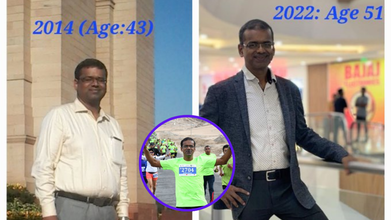- Health Conditions A-Z
- Health & Wellness
- Nutrition
- Fitness
- Health News
- Ayurveda
- Videos
- Medicine A-Z
- Parenting
- Web Stories
Can Toothache Be An Indicator Of Heart Attack?

Credit: Canva
We all must have had dental issues and pain at some point in our lives. While it could be due to a variety of reasons, a dental expert is now going viral after linking it with a heart attack. Dr Guruprasad "Guru" Srinivas, director of Cardiac Rehab at Northwell Staten Island University Hospital, said that heart attacks and pain in the left arm are considered warning signs of an impending heart attack. However, having a toothache could signal the same.
According to Srinivas, many patients, most notably women and diabetics, are more likely to show atypical signs of a heart attack. "Heart disease — and more specifically, coronary artery disease — is the leading cause of death in the world. Recognition of these uncommon symptoms can be pivotal in preventing the devastating consequences of heart disease," Srinivas told a leading American media outlet.
How Is Tooth Ache Linked To Heart Attack?
While chest pain is the most common sign of a heart attack, tooth pain can also be a significant indicator. This is because nerves that supply messages to the heart and tooth share some pathways. "Sometimes, patients will not have chest pain but describe discomfort in their back or complain of a toothache," he said.
When blood supply to the heart is restricted, pain signals can be diverted to the teeth. Pain can also be present in the arms, back, and other parts of the body. Typically, the pain is aggravated by exercise and recedes with rest.
Other Uncommon Symptoms
Besides tooth pain, other symptoms include burning abdominal pain and nausea. Profuse sweating without a cause, like heat or exercise, and cold sweats can also be a warning sign from your heart. Feeling unusually exhausted after slight exertion or even when resting can be an early red flag of heart disease, especially in women.
What Exactly Is A Heart Attack (Myocardial Infarction)?
A heart attack occurs when blood flow to a part of the heart muscle is blocked, typically by a blood clot in a coronary artery. This blockage prevents oxygen-rich blood from reaching that part of the heart muscle, causing damage or eventual death of that muscle tissue.
Common symptoms include chest pain or discomfort, shortness of breath, nausea, sweating, and pain in the arm, back, or jaw. Symptoms can vary and may be less obvious in some individuals.
Treatment for a heart attack often involves medications to dissolve the clot, restore blood flow, or prevent further clots, along with procedures like angioplasty or stenting. Lifestyle changes and cardiac rehabilitation are also recommended for recovery.
ALSO READ: Decoding Heart Emergencies: Cardiac Arrest Vs Heart Attack
How To Identify A Heart Attack?
You can identify a heart attack if you have or see someone experiencing the following symptoms:- angina or chest pain
- insomnia
- heart palpitations
- stomach discomfort or nausea
- feeling dizzy or lightheaded
- anxiety
What Is Unexplained Infertility? Why It Happens And The Steps You Can Take To Improve Chances Of Conception

Credits: iStock
Becoming a parent is usually thought of as a natural part of life, yet for many couples, the process isn't that easy. You might have taken every test, monitored every cycle, and done every doctor's recommendation—only to be informed that everything is normal. And yet, conception still doesn't occur. This infuriating and most of the time perplexing experience has a name: unexplained infertility. In contrast to conditions in which the etiology is obvious, unexplained infertility puts couples hunting for answers in reproductive medicine's gray areas. Diagnosis is often both a blessing and a reversal—relief that nothing appears "wrong," but distress that no obvious solution exists.
For most couples, parenthood is a journey of anticipation, planning, and hope. But what is a couple to do when there are normal test results, no medical red flags found by doctors, and yet no pregnancy? This is the frustrating, emotionally draining experience of unexplained infertility—a condition which brings couples more questions than answers.
During an interview with Dr. R. Suchindra, Senior Consultant – Reproductive Medicine, Milann Fertility Hospital, Bengaluru, he states, "Unexplained infertility is when a couple fulfills all the clinical criteria for natural conception—normal ovulation, normal sperm, patent fallopian tubes, and harmonious hormones—still does not conceive after more than one year of attempting to conceive under age 35, or six months above."
This paradox, too often underemphasized in the discussion of fertility, plagues couples around the globe and is becoming a growing public health issue. Infertility itself affects approximately 10–15% of married couples in India, yet as much as 30% of those cases qualify as unexplained. And although the term may sound final, doctors point out it is really more a matter of limitations in testing than an absolute lack of causes.
Why "Unexplained" Infertility Doesn't Mean "Hopeless"?
The phrase "unexplained infertility" may sound daunting, but it's worth recognizing that it doesn't equal a guarantee of impossibility. Rather, it denotes the realm of reproductive science as of today. Physicians claim that the condition is undeservedly named. What appears to be unexplained now can, in the course of time, turn out to be due to minute hormonal variations, egg or sperm quality problems, or even molecular immune responses that current testing cannot possibly measure.
Dr. Suchindra adds that medical technology is a large contributor: "The more sophisticated the diagnostic equipment, the fewer couples are in the unexplained category. Sometimes the cause is just concealed, not missing."
This is an important point because it reinterprets unexplained infertility as an obstacle to overcome—not an impossible one.
Hidden Causes Behind Unexplained Infertility
Though there is no one explanation, studies propose a cluster of underlying factors that could be responsible:
Latent Tuberculosis (Genital TB): Especially in South Asian nations, this latent infection can destroy the endometrium or fallopian tubes without overt symptoms.
Endometriosis and Muted Hormonal Disturbances: Disorders such as endometriosis, insulin resistance, or thyroid disease are not necessarily detected through regular checks but are able to interfere with ovulation and implantation.
Nutritional Deficiencies and Autoimmune Conditions: Deficiencies in some vitamins and minerals, celiac disease, diabetes, or autoimmune diseases like lupus and antiphospholipid antibody syndrome (APS) may interfere with reproductive processes.
Cervical Mucus and Immunological Factors: In certain instances, cervical mucus has antibodies that destroy sperm, a condition referred to as immunological infertility.
Egg and Sperm Quality: Counts of eggs and sperm motility can be measured, but quality is more difficult to quantify. Unhealthy eggs or undetectable sperm defects might be undetectable in routine reports but affect conception.
All of this serves to explain why unexplained infertility is still such a difficult diagnosis—because the causes are usually hidden beneath the surface.
The Emotional Burden of an Invisible Diagnosis
For couples, a diagnosis of unexplained infertility is more than a medical diagnosis—it's a psychological odyssey. A lack of obvious explanation can be followed by cycles of self-blame, anxiety, and uncertainty. There is no one to draw a roadmap for treatment in this situation, as there might be for other conditions, and so patients can feel helpless.
Dr. Suchindra stresses, "This is usually the most difficult aspect for couples. With no cause found, they are left stuck. But here's what to understand: Many couples with unexplained infertility do end up conceiving naturally or with some assisted help."
Support, counseling, and honest communication with the healthcare providers become as crucial as treatments.
Approaches That Can Improve Chances of Conception
The lack of a definite cause doesn't imply there's no hope. Indeed, a combination of lifestyle changes, medical surveillance, and new reproductive technologies usually enhances the chances considerably.
1. The Importance of Time and Patience
On occasion, physicians will suggest a "watchful waiting" plan. Couples who are less than 35 years old can be told to keep trying naturally for several more months and monitor ovulation carefully. Research indicates that spontaneous conception is possible in a high percentage of situations once tension is minimized and timing is refined.
2. Lifestyle Changes That Enhance Fertility
Having a healthy weight, consuming a healthy diet, smoking cessation, reducing alcohol, reducing caffeine intake, and engaging in stress-reducing activities like yoga or mindfulness can provide a conducive environment for conception. While these measures don't "treat" infertility, they improve overall reproductive health.
3. Medical Treatments and Assisted Reproductive Technology (ART)
When waiting and lifestyle modifications are not sufficient, physicians might prescribe treatments like:
Ovulation stimulation with medication to control or enhance egg release.
Intrauterine Insemination (IUI), wherein thawed sperm is inserted directly into the uterus when timed properly.
In Vitro Fertilization (IVF), which circumvents most natural obstacles by fertilizing eggs externally and transferring embryos.
All of them have varying success rates based on the couple's age, health, and duration of trying.
Reproductive medicine is developing fast. Genetic testing, artificial intelligence for embryo choice, and better understanding of immunological and metabolic causes of infertility will soon render the "unexplained" status much less frequent.
"Each year we find new layers of how the body prepares for pregnancy," Dr. Suchindra explains. "Our challenge as clinicians is to bridge that gap between what we know and what remains unknown, so couples can find clarity and hope."
Unexplained infertility can be a disquieting diagnosis, but it is not an impasse. Many couples still conceive naturally after a few months of waiting, while others succeed by adjusting their lifestyle and by using ART. What this process requires most is resilience, honest communication with the medical team, and the knowledge that reproductive science is continuously evolving.
As Dr. Suchindra stresses, "The lack of an answer today does not equate to the lack of a solution tomorrow." To couples on this journey, that message can convert doubt into potential.
Depressed Or Anxious? You Are More Likely To Marry Someone Who Has The Same Disorder As You

(Credit-Canva)
‘Birds of a feather stick together’ is often used to define people who share similar traits. It is human nature to find comfort with someone who is more similar to you in certain ways like your preference of socializing, shared hobbies as well as temperaments. Having a partner who gels with you because you both are similar can be a blessing, however could it also be a set back? You may have also heard ‘we attract people who are similar to us’ however, did you know this could also apply to what mental health conditions you may suffer with?
A massive study published in the Exploratory Research and Hypothesis in Medicine, looked at the health records of over 14.8 million people and found a clear trend: people with a mental health diagnosis are more likely to marry someone who also has a similar condition. This isn't just a recent trend; it's a pattern that has been growing for decades and is seen in different cultures, from Taiwan to Nordic countries.
Do We Attract People Similar To Ourselves?
The study, which analyzed the health records of over 14.8 million people in Taiwan, Denmark, and Sweden, found that people with a mental health diagnosis are much more likely to marry someone with a similar condition. The pattern has become more common over the last several decades. The researchers have a few ideas why this happens:
Shared Understanding
It's possible that people who have gone through similar mental health challenges feel a special connection. They might feel more understood and accepted by a partner who knows firsthand what they're dealing with. This shared experience can build a strong bond.
Growing More Alike
Sometimes, partners in a long-term relationship start to become more similar over time. Because they live together and face similar challenges, their behaviors and experiences can begin to match up, a process researchers call "convergence."
Social Stigma
Unfortunately, there's still a lot of social judgment around mental illness. This can make dating and finding a partner more difficult. This reality might lead people with mental health conditions to have a smaller group of potential partners, making it more likely they'll end up with someone who also has a similar background.
Do Our Mental Health Conditions Affect Our Families?
This study also uncovered some important findings about how this trend can affect families and overall health.
Passing on Conditions
When both parents have the same mental health disorder, their children are twice as likely to develop the condition themselves. This risk is highest for conditions that are known to have a strong genetic link, such as schizophrenia, depression, and bipolar disorder.
Physical Health Risks
Mental health issues don't just affect the mind; they can also impact the body. For example, people with depression are at a 40% higher risk of developing heart and metabolic diseases.
Strained Relationships
Previous studies have already shown that marriages where one partner has a mental health condition have a higher chance of divorce. These new findings add to that by showing that the marriage itself is often formed between two people who are already facing similar mental health challenges.
51-Year-Old Neurologist Loses 30 Kg: Shares His Life-Changing Weight Loss Secrets

(Credit- Dr Sudhir Kumar MD DM/X)
It is truly never too late to turn your life around and find a better version of yourself, and this neurologist is proof of that. Although you may have heard of many weight loss stories, where people overcame many difficulties and lost multiple kgs, it can be a much more difficult task to find that motivation yourself.
From 100 kgs to 70 kgs, Dr Sudhir Kumar shared his weight loss journey on social media platform X. He shared his experience and realistic tips that helped him lose the extra pounds and take a step towards a healthier future.
How Dr Sudhir Kumar Lost the Weight
Dr. Kumar's journey started in November 2020. At that time, he had some habits that weren't great for his health: he worked long hours (16-17 per day), got very little sleep (4-5 hours), and ate a lot of junk food and sweets. He weighed 100 kg and found it difficult to even walk 5 km.
To start his transformation, he focused on a simple exercise: running. But he didn't jump into it all at once. He began slowly by walking 5 km, and over the next few months, he gradually increased his distance to 10 km. After that, he started jogging and then running. His main goal was to focus on the time he spent being active, not how fast he was.
How Did Losing Weight Helped Dr Sudhir Kumar?
Later, in December 2022, he also added strength training at least three times a week to build muscle and burn more calories. These lifestyle changes led to some incredible results, both on the scale and in his overall health.
- He went from weighing 110 kg down to a healthy 70 kg.
- He felt more awake and focused at work and had more energy throughout the day.
- His resting heart rate dropped from 72 beats per minute to a much healthier 40-42 bpm, showing how much stronger his heart had become.
- His blood sugar, cholesterol, and blood pressure all got better, reducing his risk for many serious health problems.
- He also noticed a boost in his self-esteem and self-confidence.
What Are Dr Sudhir Kumar's Top Weight Loss Tips?
Dr. Kumar shared the most important lessons he learned, hoping they will inspire and guide others.
- The most important thing is to show up and be active every single day. Being consistent is more important than working out at a high intensity.
- Run at a pace that you enjoy, not one that competes with others. Your speed will naturally get better over time as you get fitter.
- Don't just stick to running. Adding other activities like strength training or cross-training will keep you from getting bored and help prevent injuries.
- Exercise works best when you also change what you eat. Focus on reducing your total calories and try eating within a specific time window each day.
- Getting 7-8 hours of sleep is non-negotiable. Good sleep helps your body recover, improves your mood, and gives you the energy you need for your workouts.
- Dr. Kumar reminds everyone that these are just helpful tips, not strict rules. He strongly advises talking to a doctor before making any big changes to your diet or exercise routine.
© 2024 Bennett, Coleman & Company Limited

